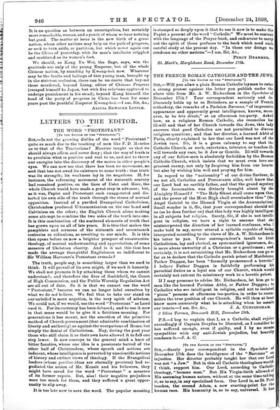LETTERS TO THE EDITOR
THE WORD "PROTESTANT."
[To Tex EDITOR OF THE " SPECTATOR."3 SIR,—Is not the growing dislike of the word " Protestant " quite as much due to the teaching of men like F. D. Maurice as to that of the Tractarians ? Maurice taught us that we should always affirm and never deny ; that the way of truth is to proclaim what is positive and real to us, and not to throw our energies into the discovery of the motes in other people's eyes. We can now see that there has been no movement, no sect that has not owed its existence to some truth : that truth was its strength; its weakness lay in its negations. If, for instance, the reforming movement of the sixteenth oentury had remained positive, on the lines of Celet and More, the whole Church would have made a great step in advance; bat, as it was, Papist and Protestant each exaggerated and dis- torted his own side of the truth through the stress of mutual opposition. Instead of a purified Evangelical Catholicism, Christendom produced Ultramontanism on the one hand and Calvinism on the other; the English Church alone making some attempt to combine the two sides of the truth into one. It is this combination of the scattered elements of truth that has grown upon us all of late years. It is this that makes the pamphlets and sermons of the sixteenth and seventeenth centuries so ridiculous, so revolting to our minds. It is this that opens before us now a brighter prospect of constructive theology, of mutual understanding and appreciation, of some measure of Christian charity. And is it not this that has made the average thoughtful Englishman so indifferent to Sir William Harcourt's Protestant crusade ?
The truth, people say, is something larger than we used to think. It will prevail of its own might, if we seek it honestly. We shall not promote it by attacking those whom we cannot understand ; and therefore the fires of Smithfield, the Court of High Commission, and the Public Worship Regulation Act are all out of date. So it is that we cannot use the word "Protestant," because we can no longer label ourselves by what we do not believe. We feel that to take our stand on our unbelief is mere negation, is the very spirit of atheism. We could not, if we would, use the word "Protestant" as Laud used it. For its currency has been debased; and to use it now in that sense would be to give it a fictitious meaning. For generations it has meant, not the assertion of the primitive method of Church government (that admirable combination of liberty and authority) as against the usurpations of Rome, but simply the denial of Catholicism. Nay, during the past year those who still claim it as their own have allowed it to fall one step lower. It now conveys to the general mind a knot of bitter fanatics, whose one idea is a passionate hatred of the other half of Christendom, whose speech and actions are indecent, whose intelligence is perverted by unscientific notions of history and extinct views of theology. If the Evangelical leaders (whose positive ideas are eternally precious) had re- pudiated the action of Mr. Kensit and his followers, they might have saved for the word "Protestant" a measure of its former repute. But, alas! their negative prejudices were too much for them, and they suffered a great oppor- tunity to slip away.
It is too late now to save the word. The popular meaning is stamped so deeply upon it that to use it now is to make the Papist a present of the word "Catholic." We must be content with the language of the Prayer-book, and endeavour to carry out the spirit of those prefaces to the book which need such careful study at the present day. "In these our doings we condemn no other nations."—I am, Sir, &c.,
PERCY DEARMER.
St. Mark's, Marylebone _Road, December 17th.






































 Previous page
Previous page